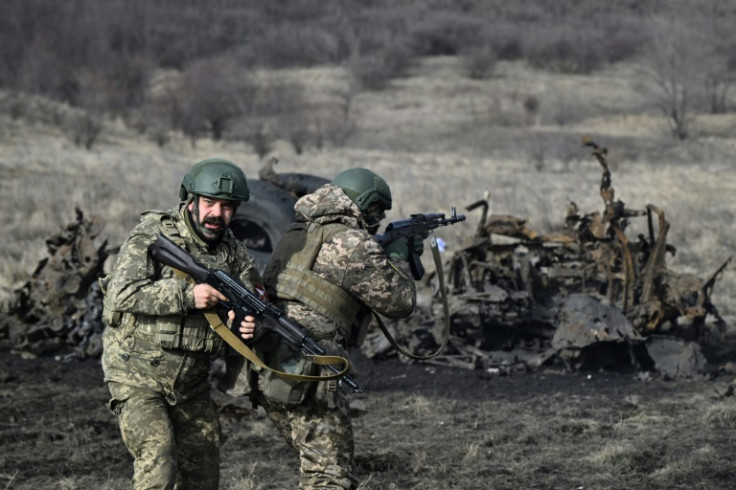
Ukraine said Friday there was fierce fighting in the beleaguered frontline city of Avdiivka that has become a main Russian target ahead of the second anniversay of its invasion.
As President Volodymyr Zelensky headed for Berlin and Paris in a new bid to secure desperately needed military aid, Ukrainian generals said there was bitter fighting inside Avdiivka and that their forces were taking up "new positions".
Zelensky said before leaving that his government would do "everything" to save lives in the symbolic city, surrounded on three sides by Russian forces.
"Fierce battles are taking place within the city," Oleksandr Tarnavskiy, a Ukrainian general in the east, said on social media.
"Our troops are using all available forces and means to restrain the enemy," he added.
"New positions have been prepared and powerful fortifications continue to be prepared, taking into account all possible scenarios," added Tarnavskiy.
Tarnavskiy called the situation in Avdiivka "difficult but controlled" and said commanders have been tasked to "stabilise the situation."
The Ukrainian military said on its social media that Ukrainian troops were being reinforced and were "standing their ground".
Russia has been trying to capture Avdiivka for months. Its fall would be a significant symbolic victory for Russia ahead of the February 24 anniversary of the start of the invasion.
Ukraine had already announced on Thursday that it was rushing new troops to Avdiivka as the position becomes increasingly perilous.
A Ukrainian army spokesman said the "complicated" operation of bringing in supplies and evacuating the few hundred civilians who remained had started.
"Avdiivka is at risk of falling into Russian control," US National Security Council spokesman John Kirby told reporters in Washington, citing Ukrainian reports.
Zelensky said Kyiv was sending as much support as possible to the region.
"We are doing everything we can to ensure that our warriors have enough managerial and technological capabilities to save as many Ukrainian lives as possible," Zelensky said during his evening address.
The battle for the industrial hub, less than 10 kilometres (6 miles) north of the city of Donetsk, has been one of the bloodiest of the two-year war.
Many compare it to the battle for Bakhmut, in which tens of thousands of soldiers were killed.
Punching through Ukraine's stretched defences at Avdiivka would be the most significant territorial gain for Moscow since it seized Bakhmut last May.
Zelensky was to go to Berlin and Paris on Friday to sign security deals and seek further military support. The visit has been made even more urgent by wrangling in the US Congress over a multi-billion aid package for Ukraine.
Ukrainian leaders have highlighted the increasingly difficult situation on eastern frontlines because of ammunition shortages and fresh Russian attacks.
On top of the US blockage, the European Union has admitted that it will only be able to send half of the one million artillery shells it promised by March.
During Friday's talks, Zelensky will seek to lock down security guarantees for his country when the war is over.
The German government said Chancellor Olaf Scholz would sign a bilateral security pact that covered Ukraine's "long-term security commitments and support".
The French presidency also confirmed that a security agreement would be signed with Ukraine, but did not provide any specifics on its content.
The European Union will have to double its military support to Ukraine to fill a gap left by the United States, a research institute that monitors assistance estimated Friday.
Republicans in the US House of Representatives are blocking authorising $60 billion in new military aid despite Ukrainian commanders and Western officials having said that Ukrainian troops are running out of ammunition.
"It is highly uncertain whether the US will send further military aid in 2024," the Germany-based Kiel Institute said in a report.
According to its data up to January 15, 2024, the United States sent 42.2 billion euros ($45.4 billion) in military aid to Ukraine between February 2022 and December 2023, at a rate of around two billion euros a month.
The European Union and its 27 members have promised 49.7 billion euros of military aid since the start of the war, but have delivered or earmarked just 35.2 billion euros.




